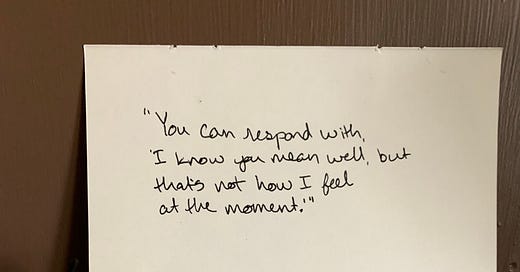Welcome back. Or welcome.
No one knows what to say when someone is grieving. That doesn’t keep us from saying things anyway, of course. Because some people can’t leave silence.
A few weeks ago, I was helping with a funeral, and the family didn’t want to hear the same thing 200 times in a row.
You know the conversation.
“I’m sorry.” “Me too.”
“How are you?” “Mostly numb.”
“I can’t imagine how hard this must be” “Yes, you can. But you don’t want to.”
“At least he’s in a better place.” “You mean not talking to you? Sorry. That was mean. But I’m not in that place. I’m here. And I’m the one having to navigate this without him.”
“If there’s anything I can do.” “Can you take some of these flowers after the funeral? Can you bring me coffee in the morning about 530 after I haven’t slept all night and just leave it on the front porch without having to be affirmed for your thoughtfulness?”
And so, I gave them a sign to put by the visitor book and the entrance to the funeral home.
+++
Thank you for coming to offer support.
As you come through the line, we wanted to help you know what to say, because this is hard.
You don’t need to ask how we’re doing or if we are okay. Those answers change every minute. And having to answer every minute gets overwhelming.
And we agree. This is a shock. And this is so sudden.
We know that you are sorry, so are we.
You know what would really help?
Remind us who you are. It’s hard to remember everyone.
And then tell us a story. About how he cared. About how he laughed. About how he helped you. About how you helped him. About what you’ll do now because of his life.
Thank you for coming and caring.
+++
That’s what the sign said. It didn’t help. People still said, “I’m so sorry.”
But what surprised the family member I talked with was that people meant it. They were sorry. For themselves. For the family member. About the situation.
It wasn’t “I’m sorry for your loss.” It was more, “I’m sorry for our loss.”
For this family, hearing how much others would miss their loved one was helpful.
(It’s kind of what I wrote about in the very first newsletter here: “Making room for a story.”)
+++
You may be looking for a lesson in this, because, of course, we are always looking for lessons, for take-aways. We want every death, every pain, every difficulty to have a lesson.
I don’t have a lesson.
But I do have a reminder.
This is hard. Grief, death, being sad, being alone, figuring out what to say, figuring out what to hear, the rest of our lives. There is no right thing to say that will stop the pain, that will instantly fix everything.
That’s why acknowledging that it’s hard before we try to offer “five quick steps” or “three sure cures” is helpful.
Thanks for stopping by. Thanks for being helpful.
See you next week.
Jon
PS - I think the sign was helpful. If you want a copy, I’ll send you a Word file.
PPS - At another graveside this week, someone came to me and said: “I’m a friend of this family. A couple years ago, we had two sudden deaths. And this family gave me a copy of your book, This is Hard. It was helpful. Thank you.”
Thank you to my friend who shared the book because it was helpful. And to others of you who do the same. I’m never grateful for the need of course. But I’m grateful to be helpful.






This is outstanding Jon. Thank you.